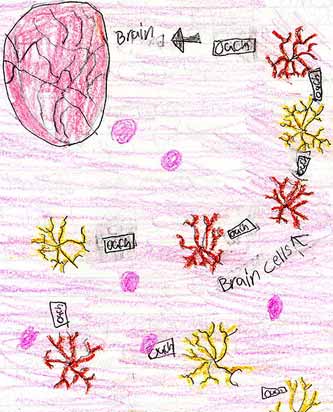

NERVOUS SYSTEM
("terribly simple, but simply terrible")
| LEARNING OBJECTIVES
Vertebral column
- Know anatomy of individual vertebrae and
regions of vertebral column--cervical, thoracic, lumbar, sacral
- Understand formation of vertebra,
intervertebral discs and relationship to notocord during embryonic
development
- Visualize in three dimensions the
relationship between vertebral column, spinal cord and spinal nerves
- Know which vertebrae bear ribs and the
anatomy of the joints/articulations between vertebrae and ribs
Spinal cord
- Visualize in three dimensions the
relationship between vertebral column, spinal cord and spinal nerves
- Understand what kinds of neurons make up
a spinal nerve. Appreciate the scale, size, and number of neurons
in each spinal nerve
- Analyze how spinal cord and spinal
nerves show basic organization of nervous system: two
modalities--sensory and motor; two types of destinations--somatic and
visceral--each with distinct neuron configuration
Neurons and their function
- Visualize neuron basic structure, size,
shape, processes, location in spinal cord, spinal nerve
- Understand propagation of action
potential as basic neuron function
- Know role of other nervous tissue cells
- Understand synapses or connections
between neurons. Reason why they form, how they contribute to
nervous sytem function and how they work
- Know the basic elements of a "motor
unit" and what it is able to accomplish in the body
|
BACKGROUND AND PREPARATION
- Review chapters 7, 12, 13, 15, 16 in Martini text
- Get Body Smart Nervous System section [link]
- Check out "Neuroscience for Kids" website--it's
the best! [link]
- See animation on vertebral column regions [link]
[need Martini text website access--link]
- See animations on Neurons and Synaptic Activity [link]
[need Martini text website access--link]
|
ACTIVITIES
- Class presentation: Nervous System
I--Organization of Peripheral Nerves, Spinal Cord, Vertebral column [PPT
download]
- View animation on vertebral column regions [link]
- Animation of messages traveling through components
of spinal nerve [link]
[need Martini text website access--link]
- Animation of reflex arc in spinal cord [link]
[need Martini text website access--link]
- Millionaire Game--Spinal Cord [PPT
download]
- Class presentation: Nervous System II--focus
on meninges, autonomics [PPT download]
- Nervous System Worksheet [Word
download]
- Animations of autonomic innervation from spinal
cord and brain to targets [link]
[need Martini text website access--link]
- Millionaire Game--Autonomics [PPT
download]
- Autonomic Jeopardy Game [PPT
download]
- Class presentation: Neurons and neural tissue
[PPT download]
- Animation of action potential in neuron [link]
- Nervous System Interactive Crossword Puzzle [link]
- Millionaire Game--Nervous System [PPT
download]
|
LAB
- Wish List for Vertebral Column and Spinal Cord
lab [Word download]
- Use bones and skeletal material to learn
anatomy of vertebral column and axial skeleton (Lab manual Exercise
4--vertebral column)
- Understand relationship between spinal
cord, vertebral column and the role of the meninges
- Dissect spinal cord on fetal pigs and
view cadaver demonstration of spinal cord
- Learn anatomy and function of spinal
cord, spinal nerves and reflexes (Lab Manual Exercise 10)
- Wish List for Neuron Anatomy and Physiology lab [Word
download]
- Neuron anatomy and physiology (Lab
Manual Exercise 9)
- Fun neuron models--do at home! [link]
- View neurons and other nervous tissue in
microscope. Great nervous system images [link]
- Virtual Leech Neurophysiology Lab (from
Howard Hughes Medical Institute) [link]
- Reflex and reaction times lab [link]
- Touch Experimental Lab [PDF
student download][link
to website background][teacher
guide][Sensory
Homunculus images]
|
|
WEB RESOURCES
"Neuroscience for Kids" website--it's
the best! [link]
BBC Interactive Body Games--try the
nervous system [link]
Nice overview of Nervous System [link]
Get Body Smart Nervous System section [link]
Action potentials--lots of details!! [link]
Great nervous system images [link] |
DO YOU LIKE TO THINK IN SEQUENCES? DID YOU LEARN THE ALPHABET ALL IN A
ROW...OR DO YOU LIKE SEPARATING THE VOWELS AND CONSONANTS?
I can imagine a compendium notebook construction for what we've done on the
nervous system that just takes our basic reflex example--the finger on the hot
stove and arm pulling back--and maps it out from start to finish. Maybe it
would be on a big piece of butcher-block paper, or the backside of an ancient
scroll (this does, after all, embody everything we can do as humans) or a bunch
of sheets taped together: First the sensory neuron interacting with the
Merkel cells on the skin, details of how the action potential is triggered to
send a message down the sensory neuron, a sense of the scale of the axon,
its excitable cell membrane, the surrounding Schwann cells with their myelin
forming the myelination or myelin sheath....onto the cell body of the sensory
neuron, its location in the dorsal root ganglion, maybe some details of that
ganglion, its relation to the spinal cord, on up through the dorsal root into
the spinal cord, a cross section of the cord, its gray and white matter, its
relation to the vertebral column....then something about "command central," the
black box of how the message is processed, at the spinal cord level, maybe back
up to the brain (details on that later), then the response...a motor neuron
triggered at its cell body, the location of that cell body (back to the spinal
cord), the way the action potential (repeat) travels down the motor neuron
axon,, the makeup of the spinal nerve where that axon is located, the different
types of neurons that would/could/should be in the spinal nerve (maybe an aside
on visceral/autonomic motor neurons--sympathetics and parasympathetics--where
they're located) and then the motor message arrives at the muscle, the terminal
of the axon and its synapse (neuro-muscular junction) with the muscle cells that
it triggers to contract--taking us right into the next topic for this part of
the semester...how muscle cells work.


Biology Department
In Ecuador:
Yavapai College Casilla 10-01-699
1100 East Sheldon Street
Ibarra-Ecuador
Prescott, AZ 86301
Tel: 593-62-608-789
Office: 4-233A
Yahoo E-mail
Phone: (928) 717-7628; (800)-922-6787
Frolich E-mail





